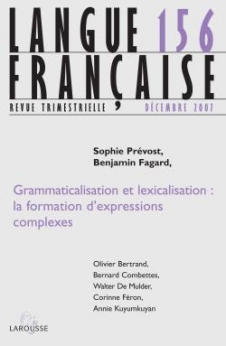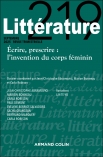
Langue française n° 156 (4/2007)
Pour acheter ce numéro, contactez-nous
Recevez les numéros de l'année en cours et accédez à l'intégralité des articles en ligne.
The goal of this contribution is to determine the phenomena involved in the formation of complex prepositions. We first discuss whether complex prepositions are to be considered a subclass of prepositions. A diachronic corpus study of a sample of such structures in Old and Middle French (a chief de lit. ‘at (the) head of’, a hore de ‘at the time of’, por l’amor de ‘for the love of’, au lieu de ‘instead of’, au-dessus de ‘above’) then enables us to show that lexicalization plays a major role in the first stages of their development. Grammaticalization appears only for a small number of already formed complex prepositions, which thereby acquire a more general meaning, with reduced phonological weight (e.g. du côté de > du côté > côté evolving from its original ‘lexical’ meaning ‘on/to the side of’ to its modern meaning ‘about’, ‘talking of’).

